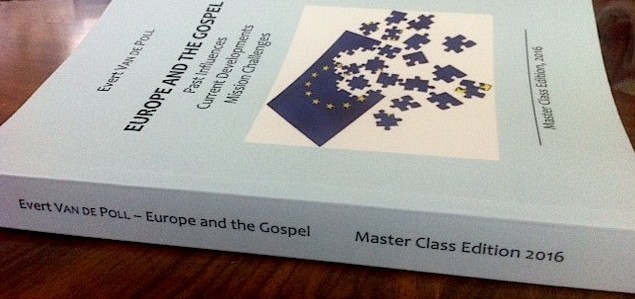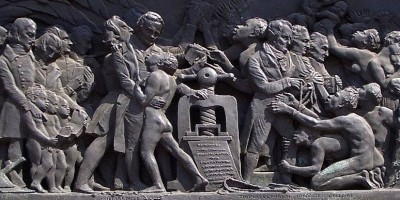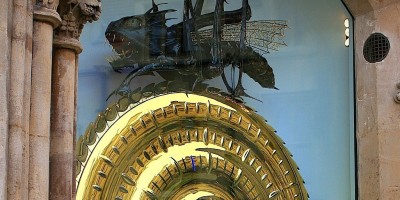This is the week of the Masterclass in European Studies. Or was. For some strange reason, when European issues are becoming more urgent and serious following the Brexit referendum and ongoing terrorist actions, insufficient registrations came in for us to hold this study week.
However, this month we will run four weekly (edited) excerpts from the Masterclass text, Europe and the Gospel, by Professor Evert Van de Poll, scheduled to teach this week in partnership with myself. This book is the best I know at this level giving a broad introduction to the role of the Gospel in shaping Europe, and to such contemporary challenges as European integration, human rights, Islam in Europe, migration and identity. The book is a special edition for the masterclass, and can only be obtained via Schuman Resources.
EVdP: Curiously, many people all over the continent recognize that they’re inside Europe but they feel and think and act as it they are outside. For them, Europe begins where their country ends. While they live in Europe in a matter-of-fact-way, they feel that Europe lies outside their national border, as a larger circle around it.
This ambiguity is typical for Europeans. When they talk about ‘Europe,’ they usually mean the continent excluding their own country. ‘Europeans’ are the inhabitants of neighbouring countries who speak foreign languages and have other customs.
Of course, we trade with other Europeans. We have educational exchanges. We translate their books. We spend our holidays in their countries; we like to discover their historic cities, their nature resorts, their touristic attractions, their restaurants and their food. But even while border controls have disappeared to a large extent within the continent, we still cross a mental border whenever we leave our national territory. Then we ‘go into Europe.’
Where do Christians stand?
Christians are no exception to this tendency to think of Europe as something outside of ‘us.’ Their (Protestant) churches have a national rather than a European scope. Europe as a mission field lies outside their country.
But this is a misleading representation of reality. Whether we like it or not, Europe starts where we live. We are part of it. Of course, we are also Dutch, French, German, and so on, but at the same time we are European. This is our continent. This is our context. This is where we are called to be a light. Communicating the Gospel in Europe is not ‘foreign mission’ but ‘home mission.’ Inversely, what we do for the advancement of God’s Kingdom in our own country is ‘European mission.’
These affirmations go against the grain of another trend: all over Europe people re-emphasize national identities, or regional identities in the case of the Flemish, Scots, Catalans and others. A growing percentage of the population is increasingly apprehensive of further economic integration, the bureaucracy of ‘Brussels,’ and federalist ideas. All of that is labelled ‘Europe’ in a pejorative sense.
In today’s multicultural societies, the majority of the population is increasingly receptive to populist ideas that capitalize on the nation, its cultural heritage, its way of life, and its tradition. All of this has to do with identity. On the one hand, there is a sense of belonging to Europe. On the other hand, people identify with their country or their region rather than with Europe as a whole.
How about Christians? To what extent do they share these trends? Populist movements often support their ideas with a claim to the ‘Christian roots’ of Europe.
What is our contribution as Christians to the future of Europe? These are challenging questions to which we must respond.
We should begin with the realisation that we are in Europe, for better or worse. Europe is not only ‘them,’ not only ‘us,’ but ‘them and us.’ Europe begins where I live, where I speak my own language, and where I attend church.
So when we talk about Europe, we are dealing with ‘us.’ Studying Europe is a good way to put local things in a wider perspective.
Paradox
Europe is the most Christianised of all continents. No other part of the world has been exposed to the message of the Bible for such a prolonged period of time. At the same time, Europe is marked by the abandonment of Christianity, more than any other part of the world. It has given birth to a secularised worldview, atheism, secular lifestyles and political ideologies, so much so that it is called post-Christian.’
How can the message that was important in the making of Europe have a positive impact on the secularised and multicultural societies of today?
This paradoxical love-hate relationship between our cultures and societies on the one hand, and the Christian religion on the other hand, really is a key to understanding our continent.
(c) Evert Van de Poll, Europe and the Gospel
Till next week,



